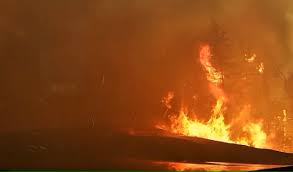After a deadly wildfire erupted in Halifax on Sunday and consumed an area covering hundreds of acres, authorities in Nova Scotia, Canada’s eastern province, ordered the evacuation of thousands of homes.
The Halifax Regional Municipality has also established a temporary housing center and warned locals early on Monday that evacuation orders are strictly enforced.
Authorities claim that the wildfire, which was fueled by strong winds and tinder-dry woodlands, has destroyed scores of homes and complicated rescue efforts.
Videos of dense smoke and massive flames went viral on social media.
No missing persons or injuries had been reported, according to Halifax Fire Deputy Chief Dave Meldrum, but there had been damage to or destruction of structures.
Meldrum added, “Our firefighters and other partners worked hard yesterday to evacuate a significant portion of our city, and last night, we remained on scene.”
“We had 100 firefighters here on scene overnight, fighting spot fires, extinguishing structures that were on fire, and preventing more structures from being lost wherever we could,” the official continued.
About 480,000 residents of the port city of Halifax reacted to the fire, which was still raging in the surrounding Tantallon and Hammonds Plains regions.
More than 60 hectares (148 acres) of land had burned, according to a statement from the port city, home to 480,000 people, and approximately 16,400 people had been forced from their houses.
“There is not yet a complete count of damage, but it is anticipated that several structures have been lost,” the municipality stated.
According to Tim Houston, the premier of Nova Scotia, “water bombers had arrived from the eastern provinces of New Brunswick and Newfoundland and Labrador to help local crews.”
Tim Houston stated on Twitter that “we are in contact with our municipal and federal partners to ensure every resource is exhausted.”
In a tweet, Justin Trudeau, the prime minister of Canada, stated that his country was “ready to provide any federal support and assistance needed,” noting that “the wildfire situation in Nova Scotia is incredibly serious.”
“We’re keeping everyone affected in our thoughts, and we’re thanking those who are working extremely hard to keep people safe,” he said.
Officials also emphasized that during the weekend, over 400 residences in New Brunswick had to be evacuated due to the flames.
The blaze is still out of control, according to Saint Andrews, New Brunswick, mayor Brad Henderson, despite recent improvements.
In addition to these fires, Alberta and British Columbia have been experiencing warm weather, which has caused a number of out-of-control wildfires to start, disrupting oil and gas production. But the majority of the fires have subsequently been put out.
Experts believe that climate change, which has made extreme weather like wildfires, heatwaves, and tropical storms worse worldwide, is to blame for the flames.
While wildfires are frequent in Canada during the spring season, Mike Flannigan, a professor at Thompson Rivers University in British Columbia and a fire weather specialist, told Al Jazeera that “this year has been very active.”
“Climate change is causing more extreme weather to occur in Canada and around the world, which is causing more intense wildfires that are hard to impossible to put out,” Flannigan said.










